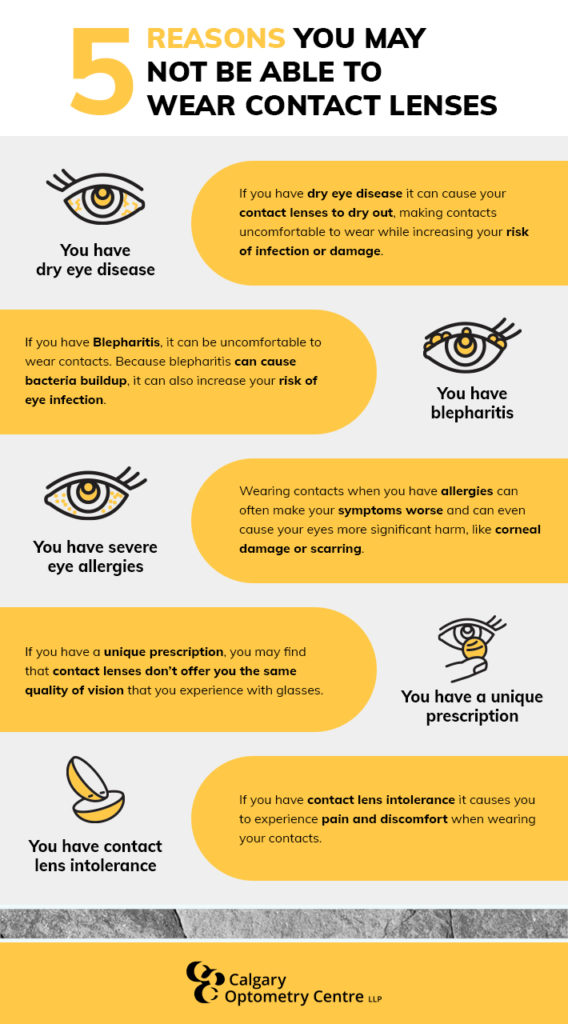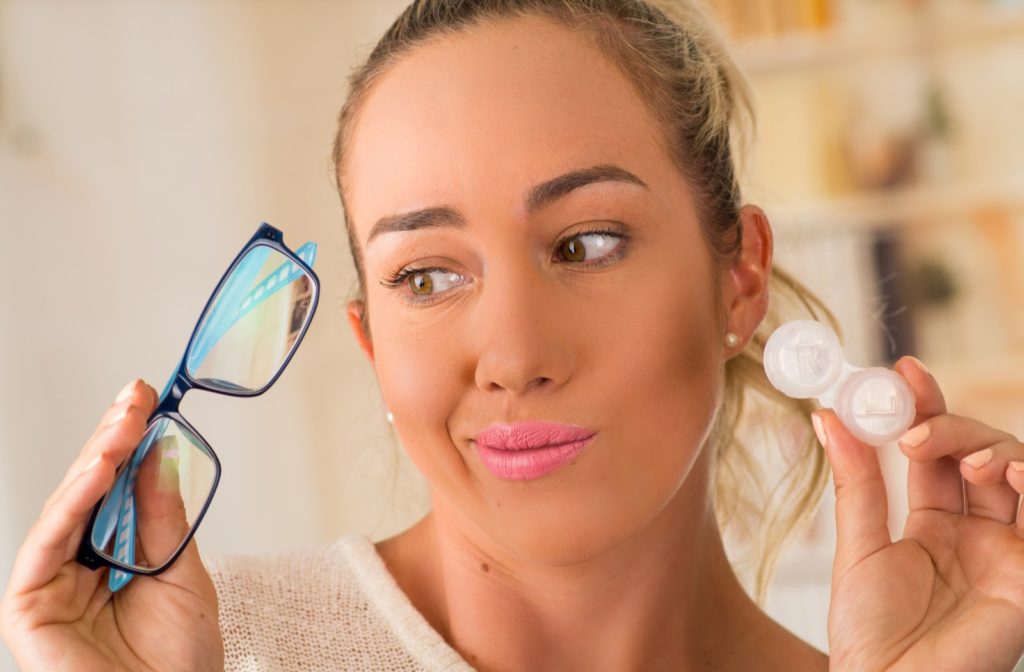Contact lenses can definitely have some benefits over wearing glasses. For example, contact lenses can offer better viewing ease, increase your eye comfort, and allow for vision correction without altering your appearance.
But for some people, contact lenses may not be the right solution. Keep reading to learn more about why some people shouldn’t wear contact lenses and the alternative solutions available to you if you’re unable to wear contacts.
How Do I Know if Contacts are Right for Me?
If you currently wear glasses but you’re interested in contact lenses, your first step should be to get a proper contact lens exam and fitting.
At Calgary Optometry Centre, we perform detailed contact lens exams to ensure that contact lenses are the right treatment for you. But why are exams necessary?
Well, because contact lenses sit directly on your eye, it’s imperative that they fit correctly, and you get the right type of contacts to suit your eye health and vision needs. Without a proper exam, contact lenses can harm your vision and can even lead to infection.
During a contact lens exam, your optometrist will:
- Ask questions about your lifestyle
- Assess the health of your eyes
- Take specific measurements
- Determine your contact lens prescription
All of this information helps your optometrist determine whether or not contact lenses are right for you. If they are, this information also helps your doctor select contacts best suited for your needs.

Why Might I Not Be Able to Wear Contacts?
There are several reasons why contact lenses may not be right for you.
You Have Dry Eye Disease
Dry eye disease is an eye condition that affects how well your tears are able to lubricate your eyes. Without proper lubrication, your eyes and vision can suffer, leaving you with symptoms such as redness, blurred vision, and an uncomfortable or scratchy sensation.
In order for contact lenses to feel comfortable, a person needs to have an appropriate amount of healthy tears. Without the right amount of tears, your contact lenses can dry out, which can make contacts extremely uncomfortable to wear, and can even lead to an increased risk of infection or corneal scarring.
Before you’re able to wear contacts, your optometrist may recommend dry eye therapy to get your eyes back to their healthy state.
You Have Blepharitis
Blepharitis is a condition that causes inflammation of the eyelids. It usually occurs when the oil glands in your eyes become clogged, but can be caused by several other eye diseases and conditions.
If you have Blepharitis, it is best to get your condition treated before wearing contact lenses. Because blepharitis usually involves bacteria buildup, it can increase your risk of eye infection while wearing contacts. In addition, it can be uncomfortable to insert, wear, and remove your lenses while you have this condition.
You Have Severe Eye Allergies
If you have severe eye allergies, it might be difficult for you to wear contact lenses. Eye allergies can be seasonal or perennial, and are often identified by symptoms such as itchiness, redness, tearing, swelling, or burning.
Wearing contacts when you have allergies can often make your symptoms worse and can even cause your eyes more significant harm, like corneal damage or scarring.
You Have a Unique Prescription
During a contact lens exam, your optometrist will determine your contact lens prescription. In some cases, your prescription may not be suitable for contact lenses.
While contact lenses are made to cover all types of prescriptions, you may find that they don’t offer you the same quality of vision that you experience with glasses.
You Have Contact Lens Intolerance
Contact Lens Intolerance is a common condition among contact-wearers. If you have contact lens intolerance it causes you to experience pain and discomfort when wearing your contacts.
This condition can be caused by a variety of factors, including allergies, poor contact hygiene, and overwear.

What are My Alternatives to Contact Lenses?
If your doctor has determined that contact lenses are not suitable for you, don’t worry! There are still other ways you can get the vision correction you want, without putting your eyes in harm’s way.
If you have an eye condition, such as dry eye disease or blepharitis, your doctor will recommend treating the condition before wearing contacts again. Once your eyes are back to their healthy state, you should be able to wear your contact lenses like normal!
If you can’t or don’t want to wear contact lenses, you can consider alternatives, such as:
- Eyeglasses
- Laser eye surgery
- Implantable contact lenses
- Specialty contact lenses
Find Out if Contacts Are Right For You
At Calgary Optometry Centre, we have the expertise and skill to determine if contact lenses are a suitable treatment for you. If not, we can help you get the treatment you need so you can experience better vision!
Book an appointment with us today for a contact lens exam to discover how we can help your vision excel.




